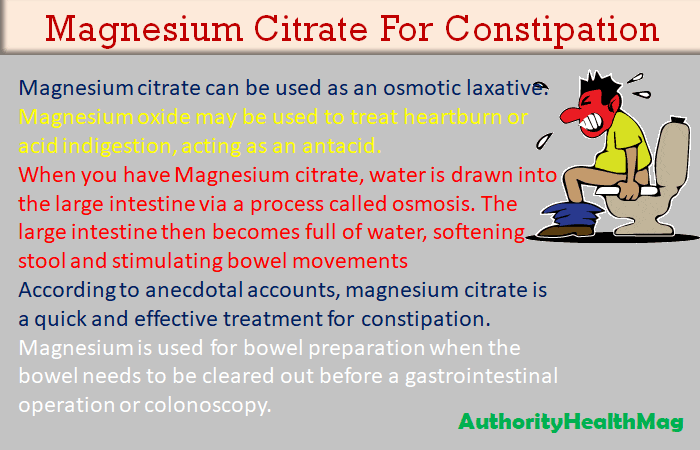Magnesium is an essential mineral necessary for several vital functions of the body. Some of the compounds of this mineral also have medicinal value in treating some common diseases. Using magnesium for constipation is an adequate natural home remedy.
Magnesium citrate for constipation is an OTC medication available under various brand names, including Citromag and Citroma.
Everyone experiences constipation occasionally. According to a study report published in the Diseases of the Colon and Rectum journal, over 4 million people in the United States have frequent constipation. This corresponds to a prevalence of about 2 percent.
In this article, we will discuss using magnesium to treat constipation.
Constipation: An Overview
Constipation is a condition that involves infrequent bowel movements. In this condition, bowel movements do not happen for two or more days.
Common symptoms of constipation include:
- Pain and strain during bowel movements
- Hard and lumpy stools
- Need manual help to empty your rectum?
- Swollen belly and pain in the stomach
- An unusually large diameter of hard stool
- Throwing up
- Not completely emptying the bowels after a trip to the lavatory
The occasional occurrence of constipation is not a matter of concern. But if you have regular or recurring constipation, you suffer from chronic constipation. Patients who have chronic constipation may develop other related illnesses like:
- Fecal impaction
- Rectal prolapse
- Anal fissures
- Hemorrhoids
- Intestinal obstruction
- Irritable bowel syndrome
If you have chronic constipation, consult your physician immediately for treatment. A delay in treatment can lead to more serious health complications.
Causes of constipation
Constipation occurs when your diet’s water and fiber content is far below what is required. Lack of good contraction of the muscles in the colon walls also leads to the accumulation of stool in the rectum.
Various other reasons cause constipation, such as:
- Leading an inactive life
- Overeating dairy products
- A sudden change in diet habit
- Excessive dehydration
- Lack of fiber and water in your diet
- Withholding the urge to poop
- Overuse of laxatives
- Stress and tension
- Eating disorder
- Lack of sleep
- Pregnancy
- Irritable bowel syndrome
- Certain medication
According to the National Institute of Diabetes and Digestive and Kidney Diseases (NIDDK), functional gastrointestinal disorders, such as irritable bowel syndrome, delayed emptying of the colon, and pelvic floor disorders, are major reasons for constipation.
You must consult your doctor if unusual bowel or stool changes last three days or more.
Magnesium For Constipation
According to a study report published by Medscape General Medicine, osmotic laxatives are useful for relieving occasional constipation. Magnesium helps you poop easily and relieves blots.
Magnesium is an osmotic laxative. It can ease constipation by pulling water into your large intestines and retaining it there for a long time. A substantial amount of water in the stomach softens and bulks up the stool. Softened stool easily moves out of the intestine and rectum.
A magnesium supplement improves muscle contraction in the rectum, resulting in a faster expulsion of poop.
It’s typically taken orally to improve low magnesium levels.
Magnesium is very gentle on the stomach. Unlike many other laxatives, it works slowly and does not cause a sudden and urgent bathroom trip.
Magnesium citrate is the most effective osmotic laxative among the many magnesium compounds available.
Magnesium citrate supplements are better than magnesium oxide to treat issues related to IBS; your GI tract easily absorbs citrate more than oxide.
How to use magnesium citrate for constipation?
Magnesium citrate is an over-the-counter (OTC) supplement in tablet and liquid forms. This supplement for constipation treatment comes in brand names such as Citroma, Citrate of Magnesia, and LiquiPrep.
This osmotic laxative increases water retention in your intestines and relaxes your bowl.
In most cases, the lack of water makes the stools dry, hard, and more difficult to pass. This laxative pulls water into the large intestine, making the stools softer and bulkier.
How do I use a liquid magnesium citrate laxative?
- Purchase it in the form of a saline oral laxative solution.
- Use in the dosage or measure recommended on the bottle of the laxative (dosage varies according to the age of the person).
- Take each dose with eight fluid ounces (240 ml) of water.
- Use this laxative only when it is strictly necessary to keep your bowl strong.
How to use magnesium in tablet or capsule form?
- Purchase 200-500 mg dietary capsules or tablets (400 mg is appropriate for adults).
- Take each dose as instructed on the packaging or as your physician recommends.
- You should drink at least eight fluid ounces (240 ml) of water with each dose.
- Taking your dose while eating is better to avoid stomach aches and diarrhea.
If you are taking magnesium supplements to meet a deficiency, the dosage must be as the National Institutes of Health recommends.

Possible Side Effects of a Magnesium Citrate Laxative
Magnesium is safe for most people. This laxative supplement may interact with certain medications, such as HIV. Some medications may become less effective due to the interaction caused by magnesium.
If you are on regular medication for some diseases or have kidney issues, you must consult your doctor before taking this supplement.
Ask your doctor if magnesium salt or citrate interferes with your medications or supplements.
Here are some possible side effects of magnesium:
- Excessive sweating
- Nausea
- Severe diarrhea
- Dizziness or fainting
- Stomach pain
- Blood-tinged stool
- Weakness and tiredness
- Allergic reactions
- Rising blood pressure
- Irregular heartbeat
- Risk of hypermagnesemia in patients with renal dysfunction.
If you experience any physical discomfort after taking this supplement, immediately consult your doctor.
Magnesium Dosage
For constipation, a magnesium citrate oral solution is the most effective option. Magnesium tablets or capsules are suitable for boosting magnesium levels in the body.
Before using the liquid solution, read the instructions regarding the dosage indicated on the bottle wrapper.
The dose of magnesium citrate varies according to the patient’s age.
For adults and children above 12 years: A single dose of 10 ounces of the magnesium oral solution with 8 ounces of water daily.
For children 6–12 years of age: A single dose of 5 oz. Of magnesium solution with eight oz. Of water per day.
For children 3-6 years old: Consult a child specialist to determine the right dosage of this laxative supplement. Usually, a single dose of 2 oz per day is appropriate for children between 3 and 6.
For children below two years: This oral laxative solution is not recommended for children below the age of 2.
How Many mg of Magnesium for Constipation?
For constipation, taking magnesium citrate oral solution (liquid form) is the right option for you to try.
Alternatively, you can also take magnesium citrate in supplement form. The dosage of the supplement depends on the age and sex of the user.
19-30-year-olds:
- Men: 400 mg/day
- Women: 310 mg/day
- Pregnant women younger than 50 years old: 350 mg/day
- Breastfeeding women younger than 50 years old: 320 mg/day
Over 30 years old:
- Men: 420 mg/day
- Women: 320 mg/day
- Pregnant women younger than 50 years old: 360 mg/day
- Breastfeeding women younger than 50 years old: 320 mg/day
Does magnesium cause constipation?
Magnesium supplements do not cause constipation. Taking oral magnesium supplements at a higher dose is more likely to cause diarrhea than constipation.
Most magnesium supplements contain magnesium glycinate. This compound is the best-absorbed form of magnesium in our body. It is very gentle on the stomach. It is less likely to cause laxative effects.
It’s an essential mineral the body requires for normal and healthy function.
Ways To Prevent Constipation
Occasional constipation is natural for most people. A sudden change in your diet habits or severe dehydration due to various reasons may cause constipation.
Here are a few tips for preventing constipation:
- Engage in regular exercise; at least 30 minutes of walking is necessary to prevent constipation.
- Drink 8 cups of water daily.
- Eat a healthy diet with enough fruits, vegetables, and fiber-rich foods.
- Do not forcefully suppress your urge to have a bowel movement. Go to the toilet as soon as you want to empty your bowels.
- When you have mild discomfort from constipation, try natural laxatives instead of prescription medicines.
If you are not getting relief from constipation after two days of treatment, you must consult your doctor as soon as possible. The doctor must diagnose the real cause of the problem and recommend the appropriate remedy.
The Final Thought
We all experience constipation from time to time, a common health problem most of us face.
The most effective ways to prevent constipation have a healthy diet, drinking enough water, and exercising daily.
You can also try magnesium citrate for constipation relief. Within a few hours of taking this supplement, you can easily empty your bowels.
However, a chronic constipation problem should be treated by a doctor instead of relying on OTC laxatives.
Recommended reading list:
